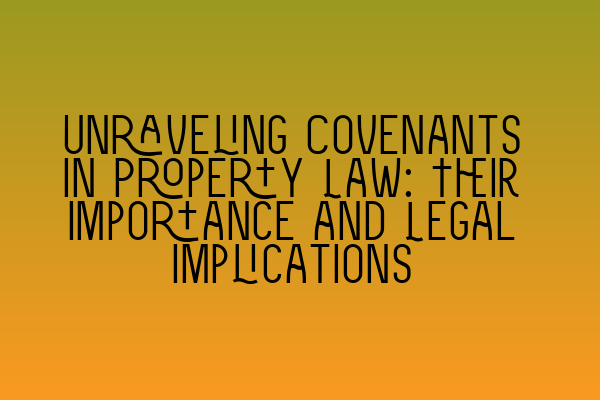Unraveling Covenants in Property Law: Their Importance and Legal Implications
Welcome to another insightful blog post by SQE Property Law & Land Law! In this article, we will dive deep into the world of covenants in property law, exploring their importance and legal implications. Covenants are a fundamental aspect of property transactions, and understanding their intricacies is crucial for both buyers and sellers. So, let’s unravel the mysteries surrounding covenants and discover their significance in the realm of property law.
Firstly, what exactly are covenants? In property law, a covenant refers to a legally binding agreement between parties concerning the use, maintenance, or restriction of land or property. These agreements are often included within deeds or contracts and are designed to govern the rights and responsibilities of the parties involved in the property transaction. Covenants can vary greatly in their nature and scope, ranging from simple agreements about property maintenance to complex restrictions on land use.
Covenants can be categorized into two broad types: positive covenants and restrictive covenants. Positive covenants require the performance of certain actions, such as the regular maintenance of a property or the payment of fees for communal services. On the other hand, restrictive covenants impose limitations or restrictions on the use or enjoyment of the property, ensuring that certain activities or developments are avoided.
The importance of covenants in property law cannot be overstated. These agreements provide legal certainty and protect the rights and interests of both parties involved in a property transaction. For buyers, covenants ensure that the property they are purchasing is subject to certain obligations, such as contributing to the maintenance of shared facilities or adhering to specific usage restrictions. For sellers, covenants can enhance property value by safeguarding the quality of the neighborhood or securing the preservation of historical or cultural landmarks.
From a legal standpoint, covenants carry significant implications. Breaching a covenant can lead to serious legal consequences, including fines, injunctions, or even the loss of property rights. Therefore, it is vital for buyers and sellers to fully comprehend the covenants attached to a property and ensure compliance with their terms. Additionally, it is crucial to review any existing covenants before entering into a property transaction, as they may impose ongoing obligations or risks that need to be carefully considered.
To gain a more comprehensive understanding of covenants and their potential legal implications, it is essential to stay informed about the latest updates in UK property laws. Our previous article, “Updates in UK Property Laws: Key Changes and Implications,” provides a comprehensive guide to recent developments in the field. This knowledge will equip you with the necessary tools to navigate the complex legal landscape of property transactions and ensure compliance with current regulations.
In addition to understanding covenants, it is equally important to be aware of other potential legal challenges in property transactions. Our article, “Legal Challenges in Property Transactions: A Comprehensive Guide,” offers insightful information on various obstacles that may arise during the buying or selling process. From disputes over boundaries to issues with title deeds, this guide provides a comprehensive overview of potential challenges and practical guidance on how to overcome them.
Considering the significance of covenants in lease agreements, our article, “Navigating Lease Laws in the UK: Essential Guidelines for Tenants and Landlords,” provides essential guidelines for both tenants and landlords. Lease covenants are a specific type of covenant that governs the relationship between landlords and tenants. Whether you are a tenant looking to understand your rights and responsibilities or a landlord seeking to ensure compliance with lease obligations, this guide will provide the necessary insights.
When it comes to property law, preparation is key. To ensure success in your property law studies and examinations, our article, “Land Law Revision Tips: Ace Your Exam Preparation,” offers valuable tips and strategies to help you master the concepts and principles of land law. By familiarizing yourself with key topics, including covenants, leases, and other legal aspects, you can approach your exams with confidence and achieve the results you desire.
Finally, to avoid common pitfalls and dominate property law questions, we invite you to explore our article, “Dominate Property Law Questions: Avoiding Common Pitfalls.” This guide provides practical advice on how to approach property law questions effectively, enabling you to craft well-reasoned arguments and provide concise legal analysis. By honing your skills in answering property law questions, you can excel in your studies and future legal career.
In conclusion, covenants play a vital role in property law, governing the rights and responsibilities of buyers and sellers. Understanding the importance and legal implications of covenants is essential for successful property transactions. By staying informed about the latest updates in UK property laws, understanding potential legal challenges, and acquiring the necessary knowledge to navigate lease laws, you can confidently engage in property transactions and protect your interests. So, keep learning, stay informed, and unleash the power of covenants in property law!
[Links to related articles: Updates in UK Property Laws: Key Changes and Implications, Legal challenges in property transactions: A comprehensive guide, Navigating Lease Laws in the UK: Essential Guidelines for Tenants and Landlords, Dominate Property Law Questions: Avoiding Common Pitfalls, Land Law Revision Tips: Ace Your Exam Preparation]
